MARITIME

TALKING POINT
Riding the Waves SUSTAINABILITY
Pioneering Global Manufacturing and Logistics
CONNECTING TRADE PROFESSIONALS WITH INDUSTRY INTELLIGENCE

MARITIME

TALKING POINT
Riding the Waves SUSTAINABILITY
Pioneering Global Manufacturing and Logistics
CONNECTING TRADE PROFESSIONALS WITH INDUSTRY INTELLIGENCE
Alireza Nemati, Global Head of Road Innovations at Kuehne+Nagel, unveils the journey behind creating the groundbreaking Road Carrier Solution
Charting a Green Course






























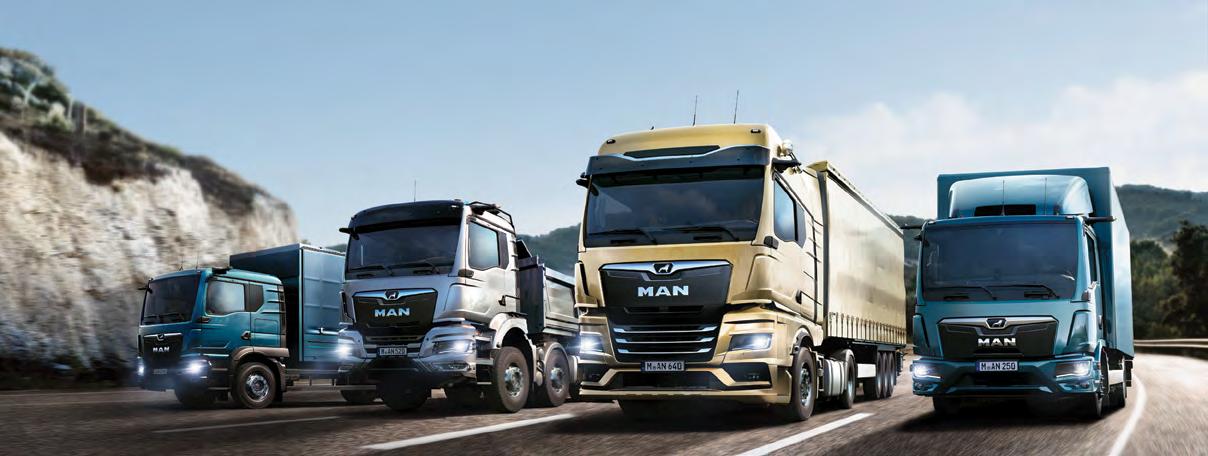














































Nestled by the coast of Lusail sits the splendor of Raf es and Fairmont Doha, where luxury is rooted in even the smallest details. Open the doors to mesmerizing hospitality and make memories in a world of sophistication.

CONNECTING TRADE PROFESSIONALS WITH INDUSTRY INTELLIGENCE
CEO
Wissam Younane wissam@bncpublishing.net
Director
CEO
Rabih Najm rabih@bncpublishing.net
Wissam Younane wissam@bncpublishing.net
Group Publishing Director
Director
Joaquim D’Costa jo@bncpublishing.net
Rabih Najm rabih@bncpublishing.net
Editor-in-Chief
Group Publishing Director
Vibha Mehta vibha@bncpublishing.net
Joaquim D'Costa jo@bncpublishing.net
Sales Manager
Editor-in-Chief
Alex Brown alex@bncpublishing.net
Vibha Mehta vibha@bncpublishing.net
Assistant Editor
Managing Editor
Aya Zhang aya@bncpublishing.net
Kasun Illankoon kasun@bncpublishing.net
Creative Lead
SUBSCRIBE subscriptions@bncpublishing.net
Christian Harb chriss@bncpublishing.net
Design Christian Harb
Editorial Design
Marketing Executive
Rizaldi Febrian
Aaron Joshua Sinanbam aj@bncpublishing.net
Marketing Executive
Digital Media Producer
Aaron Joshua Sinanbam aj@bncpublishing.net
Alexander Bungas
Videographer Alexander Bungas

PO Box 502511 Dubai, United Arab Emirates P +971 4 4200 506 | F +971 4 4200 196
For all commercial enquiries, contact jo@bncpublishing.net T +971 50 440 2706
subscriptions@bncpublishing.net PO Box 502511 Dubai, United Arab Emirates P +971 4 4200 506 | F +971 4 4200 196
All rights reserved © 2023. Opinions expressed are solely those of the contributors. Logistics News ME and all subsidiary publications in the MENA region are officially licensed exclusively to BNC Publishing in the MENA region by Logistics News ME. No part of this magazine may be reproduced or transmitted in any form or by any means without written permission of the publisher.
Printed by United Printing and Publishing | upp.ae
For all commercial enquiries, contact jo@bncpublishing.net T +971 50 440 2706 All rights reserved © 2023. Opinions expressed are solely those of the contributors. Logistics News ME and all subsidiary publications in the MENA region are o cially licensed exclusively to BNC Publishing in the MENA region by Logistics News ME. No part of this magazine may be reproduced or transmitted in any form or by any means without written permission of the publisher.
Printed by United Printing and Publishing | upp.ae
In addition to our print edition, we’re bringing you all sorts of industry news on our web mediums. We’re looking forward to interacting with our readers on all of our social media and web platforms. See you on the web!
addition to our we’re bringing you all sorts of industry news on our web mediums. We’re looking forward to interacting with our readers on all of our social media and web platforms. See you on the web!



Alife without challenges might seem ideal, but such a life would lack the essential experiences that contribute to personal growth and development, and such a life is nonexistent. Challenges and obstacles are not just disruptions; they are learning opportunities that shape our character.
In this edition, we delve into the multifaceted challenges within the logistics sector. The Red Sea region has faced
significant turbulence since the beginning of the year, resulting in widespread disruptions and potential capacity losses across various markets. Nevertheless, companies like Maersk for instance, are demonstrating remarkable resilience as they strive to mitigate these effects. Increased investment in technology and automation has helped improve efficiency and reduce dependency on manual processes. Partnerships with tech firms have enabled better tracking, forecasting, and management of logistics operations.
Moving on, our cover story focuses on Kuehne+Nagel, revealing the intriguing journey behind the development of their innovative Road Carrier Solution. This narrative not only showcases the milestones they have reached but also delves into the obstacles they faced throughout the process. In an exclusive conversation, Alireza Nemati, Global Head of Road Innovations at Kuehne+Nagel, shares the path behind designing the breakthrough Road Carrier Solution.
Additionally, this issue offers other exciting reads such as FedEx's ongoing technological and innovative advancements, insights into the e-commerce landscape in the UAE and Saudi Arabia with IQ Fulfillment, Kibsons' initiatives in promoting a greener future through technology and sustainability, and much more.

Xiaoyue (Aya) Zhang xiaoyuezhangg
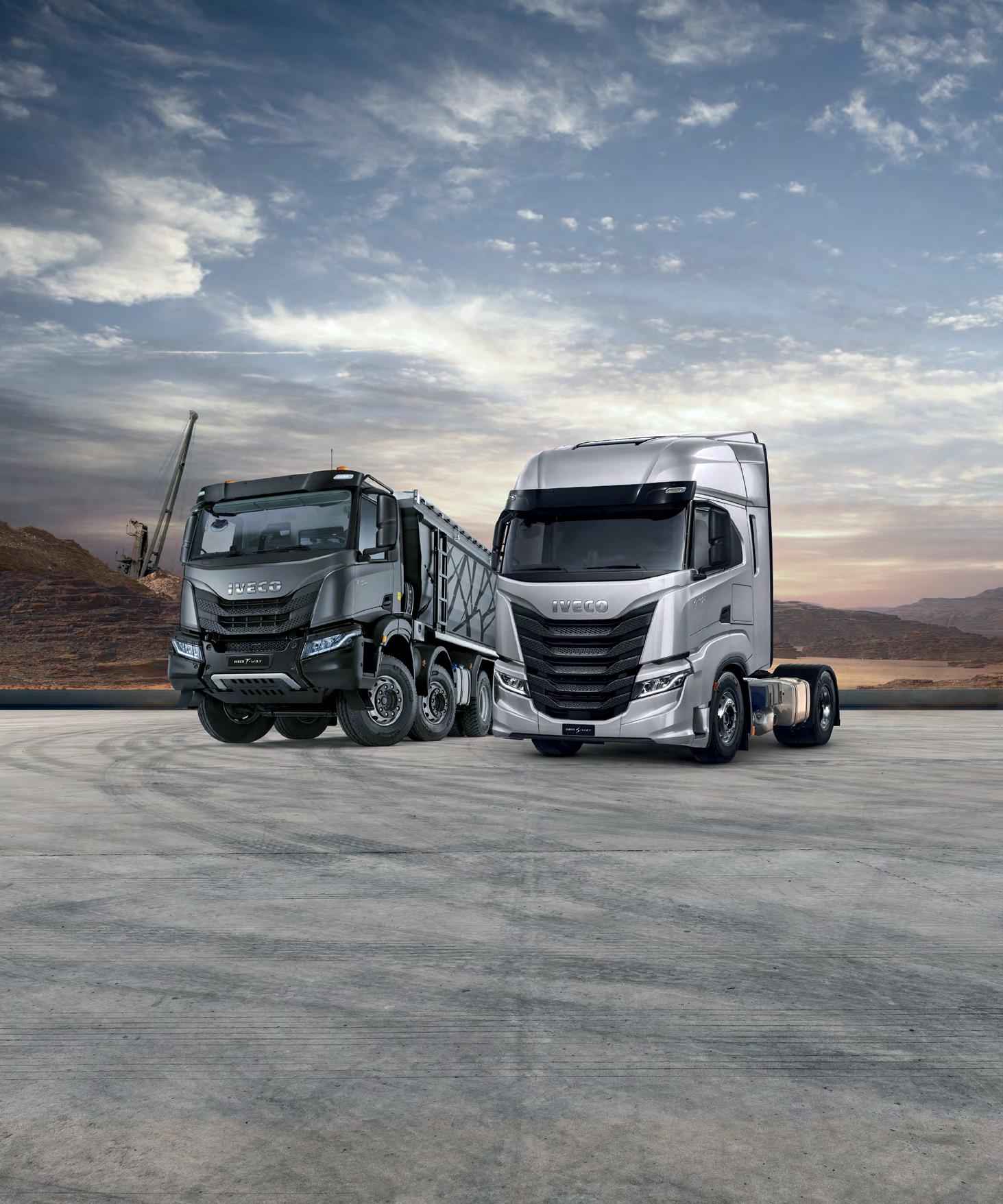
New IVECO T-Way: high productivity and safety on off-road terrains
With a complete line-up of AWD and PWD versions and the the 16-speed HI-TRONIX automated gearbox, the IVECO T-Way features a host of functionalities such as Rocking Mode, Off-road Mode, Creeping Mode and 4 reverse gears to tackle with ease the toughest off-road conditions. The new architecture of the EBS system, combined with disc brakes on all wheels, greatly improves the vehicle’s performance and the driver’s safety in the most demanding applications.
New IVECO S-Way: high technology and efficiency for on-road missions
The new IVECO S-Way, with a completely redesigned and reinforced cab, offers a wide choice of Euro III/V diesel engines, a delivering class-leading power from 360 HP to 560 HP Euro III / 570 HP Euro V and superior fuel-saving devices, such as anti-idling feature, Ecoswitch, Ecoroll and Smart Alternator, 12-speed HI-TRONIX automated transmission with the most advanced technology in its category, electronic clutch and best-in-class torque-to-weight ratio.

Step into a world of opulence when you book a Suite at Raffles Doha.
Experience the added luxury of QAR 750 credit to spend on dining in the hotel, and QAR 500 towards any Spa treatment.
Children aged 12 and below are welcome to indulge in the enchantment of complimentary dining.
Rates starting from QAR 3,500 per night
For reservations, please call +974 4030 7100 or email reservations.doha@raffles.com


The agreements highlight the strong bilateral ties between the two nation
AD Ports Group has signed a definitive concession agreement with the Red Sea Ports Authority (RSPA) to develop, operate and manage three cruise terminals at Safaga, Hurghada, and Sharm El Sheikh ports.
AD Ports Group’s total investment of $4.7 million over the next 15 years will cover management and operations of the three cruise terminals, expected to be operational in 2025, to provide new services, improve access for cruise operators and add new itineraries through the group’s cruise terminal network in the Red Sea. The agreement aims to further strengthen AD Ports Group’s cruise business in the Red Sea region, supporting volumes of cruise passengers and elevating passenger and cruise experiences.
The definitive agreement was signed at the Egyptian Cabinet headquarters in
Cairo in the presence of His Excellency Dr Mostafa Madbouly, Egypt’s Prime Minister; His Excellency LieutenantGeneral Kamel El Wazir, Egypt’s Minister of Transport; Her Excellency Mariam Al Kaabi, Ambassador of the UAE to Egypt; Captain Mohamed Juma Al Shamisi, Managing Director and Group CEO of Abu Dhabi Ports Group; Ahmed Al Mutawa, Regional CEO, Abu Dhabi Ports Group; and Major General Osama Saleh, Vice- Chairman of the Board of Directors of the Red Sea Port Authority.
AD Ports Group and the General Authority of the Suez Canal Economic Zone (SCZONE) initialled two 30year concession agreements for the development, management, and operations of a Ro-Ro terminal and a cruise terminal at Sokhna Port.
Captain Mohammed Juma Al Shamisi, Managing Director and Group CEO, AD Ports Group, said: “We’re happy to build upon our initial agreement signed earlier in January. Today’s signings
reaffirm our commitment to bolstering the cruise tourism sector in the Red Sea, through providing world-class facilities and services to passengers, while further strengthening bilateral ties between the UAE and Egypt, in line with the vision of our wise leadership.”
“Sokhna is strategically positioned on the western shore of the Gulf of Suez. We are keen on collaborating with our partners at the General Authority of the Suez Canal Economic Zone to fulfill the region’s requirement for prime Cruise and Ro-Ro services.”
The agreements reaffirm strong bilateral ties between the two nations and follow a definitive concession agreement signed in December 2023 with the Red Sea Ports Authority (RSPA) for the development and operations of a multi-purpose terminal at Safaga Port, bound to be the first internationally operated port serving the Upper Egypt region with investment of US$200 million made over three years.

The project will create approximately 700 jobs including highly skilled research, engineering, and advanced manufacturing positions

Jebel Ali Free Zone (Jafza) and Eaton, a global intelligent power management company, today signed an agreement to build a new sustainable campus, bringing together Eaton’s Dubai-based commercial, manufacturing, and support functions while providing capacity for growth in the future.
The project will extend Eaton’s research, engineering, and manufacturing capacity and aims to significantly boost Dubai’s capabilities in the advanced manufacturing of electrical and electronic components that are required to deliver safe and efficient power for several industries including data centers, buildings, and solar energy.
The construction of the facility, covering more than 500,000 square feet, will begin in 2025 and is expected to be completed in 2026. The manufacturing capability will be complemented by a new R&D facility to house a stateof-the-art center dedicated to sustainable manufacturing, power management, machine learning, AI, and other related fields. The project will create approximately 700 jobs, ranging from high-skilled engineering roles to advanced manufacturing positions.
The campus will leverage sustainable technology and demonstrate how commercial and industrial buildings can play an important role in the energy transition. The manufacturing center will be fully digitally enabled, using automation, analytics, and advanced robotics to enhance production processes, fully embracing Industry 4.0
principles. It will set a benchmark for sustainable buildings and advanced manufacturing in the region.
The signing ceremony took place at Jafza in Dubai, attended by His Excellency Sultan Ahmed bin Sulayem, Chairman and CEO of DP World, Craig Arnold, Chairman and CEO of Eaton, and senior management from both companies.
Speaking at the signing ceremony, H.E. Sultan Ahmed bin Sulayem said: “This strategic partnership with Eaton is a significant advancement in our efforts to develop smart manufacturing facilities in Jafza, directly supporting Dubai’s D33 strategy. We aim to further strengthen Dubai’s standing as a global leader in high-tech and automated manufacturing. Once fully operational, the plant is expected to generate a substantial impact on the UAE’s economy, contribute towards the transition to sustainable energy and provide valuable opportunities for young Emiratis.”
Craig Arnold, Chairman and CEO, Eaton, added: “This new partnership with DP World and Jafza underscores our commitment to growth in the region, and supports Dubai’s D33 transformation to position the city as a leader in hightech manufacturing and innovation. Our efforts are pivotal in promoting green and sustainable manufacturing through smart factory initiatives and increasing our R&D capability. This will drive the continued development of Emirati talent, and help our customers and partners achieve a sustainable energy transition.”

The international event will enable Four Winds Saudi Arabia Limited to strengthen their partnerships and expand their global reach
In a new step to strengthen its presence on the international stage, Four Winds Saudi Arabia Limited, a Saudi leader in comprehensive and integrated moving and logistics services since 1979, today announced its participation as a Principal Sponsor at the 2024 FIDI Conference, which will be held in Edinburgh, Scotland, from May 12 to May 15, 2024.
Nizar Al Mani, CEO of Four Winds Saudi Arabia Limited, said: “Our principal sponsorship of the FIDI Conference 2024 signifies a strategic move to enhance our international presence. Participating in this prestigious event within the moving and relocation industry enables us to expand our global partnerships and reinforce our robust market relationships. This opportunity allows us to improve our operations and offer comprehensive moving and logistics services globally, including moving and relocation of
antiques and artwork, live events, personal luggage, medicines and pharmaceuticals, general cargo, perishable items, and hazardous materials, and more.”
The FIDI Conference 2024 is set to showcase the latest advancements in the international moving and relocation industry. This premier event will unite member companies from over 100 countries, offering unparalleled opportunities to fruitful business connections. Attendees will also have the chance to engage with numerous global experts. Building on last year’s success, which saw participation from over 550 specialists, this year’s conference promises to be an equally impactful gathering.
FIDI is the largest global alliance of international moving and relocation companies, with members in over 100 countries. All FIDI affiliated companies have one thing in common: their high
level of quality service – and they can prove it. The FAIM and FIDI DSP Quality labels, mandatory for all FIDI members, are the most stringent and comprehensive quality standard for the international moving and relocation industry, regularly audited by an independent third-party, EY.
Established in 1979, Four Winds Saudi Arabia Limited, a Saudi leader in comprehensive and integrated moving and logistics services, has become a cornerstone in the moving and logistics sector, offering comprehensive and integrated services. With over four decades of expertise, the company has earned a distinguished reputation as one of the most trusted providers in the Kingdom of Saudi Arabia and Bahrain. Its partnerships and robust relations with leading international organizations—including IATA, FIATA, IAM, and FIDI—underscores its dedication to quality and customer satisfaction.
United Motors & Heavy Equipment will provide a fleet of state-of-the-art MAN trucks
United Motors & Heavy Equipment (UMHE) and Emirates Flight Catering (EKFC), a leader in the aviation catering industry, are pleased to announce the official signing of a deal focused on enhancing operational efficiency within the demanding aviation sector.
Mahmood Ameen, CEO of Emirates Flight Catering, and Khalifa Al Ketbi, Managing Director of United Motors & Heavy Equipment, formally signed the deal.
Under the terms of the partnership, UMHE will provide EKFC with a fleet of cutting-edge MAN trucks, renowned for their reliability, advanced technology, and robust performance. These vehicles are expected to bolster EKFC’s operational efficiency by expediting deliveries and ensuring the seamless flow of goods and services critical to maintaining EKFC’s industry-leading service.
“We are thrilled to partner with Emirates Flight Catering, a leader in the aviation catering industry.”
stated Khalifa Al Ketbi of UMHE. “This collaboration not only reflects our commitment to providing topquality transportation and logistics solutions but also our dedication to supporting the operational excellence of our partners.”
Mahmood Ameen of Emirates Flight Catering noted: “As we continue to enhance our logistics and operational capabilities, the addition of these new MAN trucks from UMHE represents a significant investment in logistics efficiency for Emirates Flight Catering. This acquisition ensures that we can consistently deliver the highest standards of service to our clients by investing in the latest equipment from a leading manufacturer like MAN.”
Positioning
By leveraging the capabilities of the new MAN truck fleet, EKFC is poised to unlock new levels of efficiency. This will further solidify its reputation for exceptional service while meeting the ever-growing demands of its global clientele with even greater precision and speed. This positions both UMHE and EKFC to drive innovation and excellence within their respective industries.
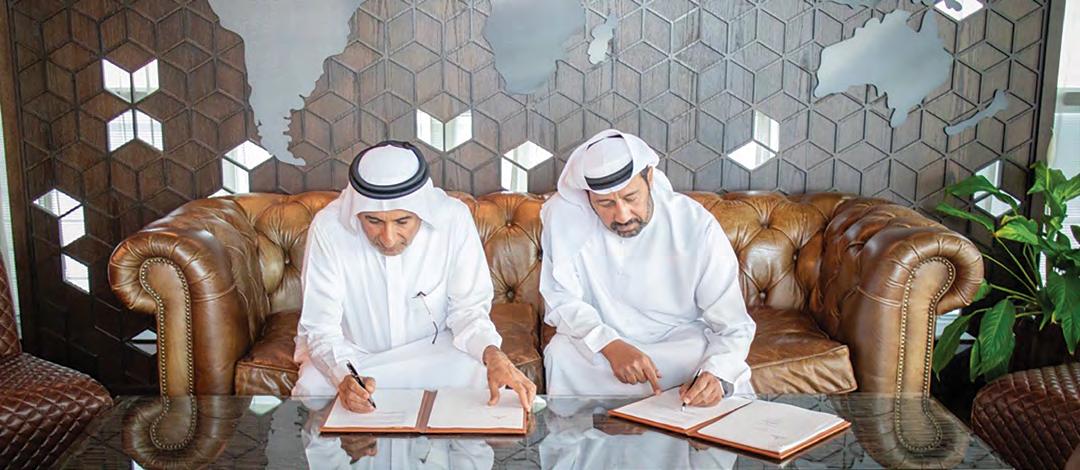

Hafeet Rail marks the newly unveiled brand identity of the joint venture between Oman Rail, Etihad Rail, and Mubadala
Marking a significant milestone, Etihad Rail, Oman Rail, and Mubadala Investment Company signed a partnership agreement during Sultan Haitham bin Tarik’s state visit to the UAE. This initiates construction on their joint railway project. The civil works tender was awarded to an Omani-Emirati alliance led by Trojan Construction Group and Galfar Engineering, along with
Tristar Engineering & Construction and NICC. Siemens and HAC secured the systems and integration tender to equip Hafeet Rail with advanced technologies like the European Train Control System (ETCS) Level 2 and GPS tracking.
Key dignitaries, including Sheikh Hamed bin Zayed Al Nahyan, Abdulsalam bin Mohammed Al Murshidi, and Suhail bin Mohammed Al Mazrouei, among others,
attended the signing ceremony.
Etihad Rail, Oman Rail, and Mubadala Investment Company have introduced their joint venture’s new corporate identity, Hafeet Rail, named after Jebel Hafeet, a landmark symbolizing the connection between Oman and the UAE. This strategic and historic region is renowned for its natural beauty and rugged terrain. His Highness Sheikh Theyab bin Mohamed bin Zayed Al Nahyan, Chairman of Etihad Rail, highlighted that the project aligns with the leadership’s vision to enhance historical ties, economic integration, and social connections between the two countries, marking a new phase of cooperation.
His Excellency Abdulsalam bin Mohammed Al Murshidi, President of the Oman Investment Authority, emphasized the railway network’s significance in boosting the logistics sector, stimulating industrial growth, and attracting investments. This will enhance Oman’s and UAE’s global trade competitiveness.
His Excellency Suhail bin Mohammed Al Mazrouei, UAE’s Minister of Energy and Infrastructure, praised the project’s efficiency and early achievements. He underscored the railway network’s role in fostering local and regional trade, creating infrastructure opportunities, and contributing to both nations’ sustainable development and economic diversification.
His Excellency Mohamed Hassan Al Suwaidi, UAE Minister of Investment and ADQ CEO, highlighted the joint venture’s achievements over the past 18 months, particularly the completion of engineering and preparatory work that has paved the way for construction. He emphasized the network’s crucial role in enhancing local and regional trade, creating new opportunities in infrastructure, transportation, and logistics, and promoting economic diversification
and comprehensive development. Al Suwaidi also noted the tourism benefits from improved travel accessibility between Oman and the UAE.
Eng. Abdulrahman Al Hatmi, CEO of Asyad Group, underscored the project’s significance in reinforcing Oman and the UAE as key logistical hubs for global trade amid the GCC’s economic boom. He praised the strategic vision and foresight of Oman and the Emirates in fostering an integrated transportation ecosystem to reshape regional logistics.
The project strengthens both nations’ strategic and economic goals, boosting their status as critical points for importing and distributing goods. It promises to transform the logistics landscape in Oman and the UAE, enhancing economic competitiveness through reliable and sustainable transportation solutions, improving connectivity between sea and land ports, and reducing time and costs.
The $3 billion joint network economically solidifies the UAE and Oman as regional logistics hubs, creating job opportunities and downstream economic benefits across various sectors, including mining, iron and steel, agriculture, food, retail,
e-commerce, and petrochemicals.
Hafeet Rail will facilitate the transport of over 15,000 tonnes of cargo per journey, supporting fast, safe, and sustainable transportation services for diverse goods.
Passenger rail services will also link key population centres, promoting social and familial bonds while boosting tourism. The innovative solutions ensure that travel between the two countries is smooth and convenient. The trains will travel up to 200 kilometres per hour, covering the distance between Sohar and Abu Dhabi in 100 minutes and between Sohar and Al Ain in 47 minutes. Each train will accommodate up to 400 passengers.
The signing of these agreements highlights the steadfast support from both governments, underscoring their dedication to the project’s execution and progress. This commitment aligns to strengthen the historical and cultural ties between the two nations and enhance collaboration in economic, commercial, investment, artistic, and developmental spheres. The agreements also align with the leadership’s longstanding directives to establish a joint railway network, contributing to the long-term sustainable development of both countries.

How
As the global community deals with the twin challenges of climate change and resource depletion, industries worldwide are exploring innovative solutions to mitigate their environmental impact. One sector that stands at the forefront of this transition is logistics. The transportation and logistics industry accounts for slightly more than one-third of global carbon dioxide (CO2) emissions, establishing it as the primary emitter in many developed nations.
The adoption of e-mobility in logistics promises to revolutionize the industry by enhancing sustainability, reducing carbon footprints, and fostering ecofriendly practices. According to the Global Electric Mobility Readiness Index – Gemrix 2022, there has been a significant surge in the adoption of electric vehicles (EVs) globally.
Governments in the Middle East are fast-tracking the advancement of EV technology. The UAE, for instance, aims to be carbon neutral by 2050 and holds the 8th position worldwide in readiness for electric mobility.
Moving towards electric mobility is very important for reducing CO2 emissions in transportation

and logistics. EVs can function using renewable energy sources, which helps to reduce their overall carbon footprint. The UAE actively promotes electric mobility to reduce emissions and enhance sustainability. In addition, the country has launched initiatives such as the Dubai Green Mobility Strategy 2030, which aims to increase the number of electric and hybrid vehicles in government fleets and encourage the adoption of EVs through incentives like free parking and charging stations.
Aramex, a prominent global logistics and transportation solutions provider, has implemented a fleet of fully electric motorcycles for its lastmile delivery services in the UAE. This marks a larger pattern of companies in the country actively adopting sustainable practices. Emirates Post has also introduced electric delivery vans, and DHL Express has pledged to transition a part of its delivery fleet to electric
vehicles. This collective effort demonstrates a commitment to reducing carbon emissions and promoting environmental sustainability in the region.
E-mobility can also significantly reduce noise pollution. Electric motors are much quieter than their internal combustion engine (ICE) counterparts, which is particularly beneficial in urban areas where noise pollution is a significant concern. This makes electric delivery vehicles ideal for nighttime operations in residential areas, thereby improving the quality of life for urban inhabitants.
The rapid advancements in technology are another key driver of e-mobility in logistics. Battery technology, for instance, has seen significant improvements in energy density, charging speed, and cost. Innovations such as solid-state batteries promise even greater efficiency and safety than current lithium-ion batteries.
Autonomous driving technology is another area poised to revolutionize e-mobility in logistics. Self-driving electric trucks can optimize routes, reduce energy consumption, and improve delivery times. Combined with smart logistics management systems, these technologies can enhance the efficiency and sustainability of logistics operations.
Furthermore, developing extensive charging infrastructure is crucial for the widespread adoption of e-mobility. Public and private sectors are collaborating to build fast-charging networks, battery-swapping stations, and integrated energy management systems that support the seamless operation of electric fleets.
Despite the promising potential of e-mobility, some challenges need to be addressed to ensure its successful integration into logistics. One major challenge is the limited range of electric vehicles, which can pose a constraint for long-distance logistics. However, continuous improvements in battery technology and the development of efficient charging infrastructure are expected to alleviate this issue. The high upfront cost and necessary infrastructure pose challenges for electric vehicles (EVs). Though EVs offer a lower total cost of ownership, the initial investment can be a barrier. Financial incentives, government subsidies, and innovative financing models are being introduced to address this. For example, governments may offer tax credits or rebates to reduce the purchase price of EVs, making them more affordable. Additionally, innovative financing options like leasing and pay-per-use models can help logistics companies manage costs more effectively. By leasing electric trucks instead of purchasing them outright, companies can avoid large upfront expenses while still benefiting from the lower operating costs and reduced environmental impact. This approach also allows companies to stay flexible and update their fleets with the latest technology without bearing the full cost of ownership.

and business models since most of the studies focused on European countries, China, and the USA. Conventional business models are changing and most of them are going through transformation. Competition is reshaped, and new players are entering the market and the business of mobility and sustainable and smart cities. As a knowledge gap, there is limited inclusion of social factors associated with sustainable electric road-freight transport development, which have not been given much attention. Finally, limited inclusion of the charging infrastructure and fleet replacement policies has been identified as another area which lacked investigation.
Various studies identified knowledge gaps in the area of e-mobility under a number of categories. This includes a lack of integration of electric logistics vehicles into the multimodal transport chain. This multimodal integration, along with eco-friendly vehicles, is essential. In addition, there is a lack of long-haul approaches and electric heavyduty truck assessments. Only a few studies addressed long-haul operations for economic and environmental analysis considering inter-city transportation across logistics facilities that usually utilize large trucks. Another knowledge gap is related to limited studies in emerging economies
In the coming years, sustainability will significantly continue to shape the future of logistics, with its importance steadily increasing across the industry. This shift is influencing all aspects of the logistics ecosystem. Manufacturers are recognising the need to contribute to environmental protection by investing in cleaner transportation methods. Companies are investing in e-mobility R&D, showcasing a strong commitment to electrification and its environmental and ecological advantages. Environmental considerations also influence vehicle demand, with customers prioritizing sustainability in their choice of logistics partners. They are actively seeking ways to reduce carbon footprints and energy consumption. As logistics and transportation companies face pressure to control carbon emissions, the demand for electric vehicles is expected to continue rising.

As Saudi Arabia progresses towards the ambitious goals outlined in Vision 2030, its logistics sector will play a pivotal role in diversifying its economy
In the dynamic global logistics landscape, seamless integration of transportation and distribution networks is pivotal for powering economic growth across various sectors. By ensuring efficient and effective movement of goods,
services, and people, logistics is fundamental to economic diversification and reducing reliance on traditional revenue streams.
Saudi Arabia’s booming logistics sector is not only enhancing
connectivity and infrastructure but is also stimulating growth in the hospitality, retail, and real estate industries. With the explicit aim of reducing its dependence on oil and further strengthening public service sectors such as health, education, infrastructure, recreation, and tourism, the Kingdom is leveraging its strategic geographical position at the crossroads of important international trade routes that link Asia, Europe, and Africa.
Saudi Arabia’s strategic geographical location is a crucial advantage in the Middle East logistics market, which is expected to approach US$ 97.1 billion by 2030, with an annual growth rate of more than 5.7%. The Kingdom has significantly improved its logistics infrastructure such as Saudi Arabia Railways’ (SAR) recent plans to expand the kingdom’s 4,500 rail network to 8,000 kilometers over the next five to seven years.
The Saudi government has invested billions of dollars in developing ports and airports, significantly enhancing the country’s infrastructure. For example, the expansion of the King Abdulaziz Port in Dammam has enabled it to account for more than a


quarter of the country’s imports in the first quarter of 2024. The development of the Jeddah Islamic Port demonstrates the country’s efforts to improve its shipping capabilities, create 400 job opportunities, both directly and indirectly, and provide training for national staff in the logistics services sector.
These investments play a crucial role in the regional supply chain,

enhancing the Kingdom’s export potential and facilitating easier access to international markets for emerging sectors.
Technological advancements such as artificial intelligence (AI), blockchain, and the Internet of Things (IoT) are being increasingly embraced within Saudi logistics. These innovations are set to transform the industry by boosting supply chain efficiency and transparency, reducing costs, and improving service quality. This technological shift aligns with Saudi Arabia’s overarching strategy to increase targeted investments in the AI sector to SAR 80 billion by 2030. The logistics industry is rapidly evolving under the dual influences of digitalization and sustainability. AI, in particular, is being aggressively adopted in Saudi Arabia, with plans to deploy self-driving vehicles and aim for 15% of its public vehicles to be autonomous by 2030. Additionally, several mega projects are in progress to develop and implement
autonomous transportation systems, showcasing the kingdom’s commitment to cutting-edge technology and efficiency. This strategic application of logistics fosters a vibrant environment for both new investments and the expansion of established industries, demonstrating how central logistics is to achieving broad economic objectives and building resilient economic frameworks.
The logistics sector is a cornerstone of Saudi Arabia’s transformative strategy under Vision 2030. By capitalizing on its geographical location, investing in infrastructure, adopting new technologies, and focusing on sustainability, the Kingdom is setting a foundation for robust economic growth that extends far beyond its traditional oil-based economy. This holistic approach will not only strengthen the Kingdom’s position in global trade but also support its transition to a dynamic, diversified economy and a global powerhouse.

Christopher Cook, Managing Director at Maersk UAE, Oman & Qatar discusses the state of maritime logistics in the region during pivotal moments
Overview
The Middle East plays a vital role in global supply chains due to its strategic location at the crossroads of major global trade routes, facilitating connections between Western and Eastern markets for manufacturers and consumers. The region is also experiencing significant economic diversification, particularly in countries like UAE and Saudi Arabia, which is driving growth in global
trade. As trade expands, there is an increasing demand for shipping, warehousing, distribution, and other logistics services.
The Middle East boasts world-class port infrastructure, exemplified by hubs like Jebel Ali Port in Dubai, Port of Salalah in Oman, and King Abdullah Port in Saudi Arabia, which are equipped with advanced capabilities

to handle large cargo volumes efficiently. These ports serve as crucial access and transshipment points within the region and beyond. In terms of trends, the Middle East mirrors the global landscape. Efficiency and reliability are top priorities here, and shipping lines, port operators, and logistics providers are making great efforts to achieve both. Additionally, there is also a greater focus on the deeper adoption of digitalisation and a growing awareness around sustainability.
The primary challenges encountered by the industry in the Middle East can

be categorized into three categories:
• Attracting Talent
Amid increased job opportunities, changing market dynamics, and growing localisation laws, the quest for top talents in the Middle East is marked by fierce competition. Maersk, as a global company, aims to attract and retain exceptional individuals, with a specific focus on effectively recruiting and retaining outstanding local talent in the region.
• Alternative Green Fuels
While incorporating green fuel vessels into fleets, there is the challenge of insufficient green fuel and the cost difference between green and fossil fuels. To address this, more companies need to manufacture green fuels. Equally important, regulations establishing a pricing mechanism to bridge the cost gap are crucial. These measures aim to incentivize more customers to choose environmentally friendly shipping options.
No entity can navigate this path
alone; ongoing collaborative efforts from customers, partners, industry peers, and regulators are vital to accelerating the shift towards netzero emissions and fostering a sustainable business model.
• Geopolitical Challenges
With a strategic location at the heart of global trade in the Middle East, the industry is exposed to geopolitical events in neighboring countries. The 2022 conflict between Russia and Ukraine has resulted in heightened inflation and increased consumer and energy prices. Moreover, recent conflicts in Gaza have sparked broader tensions in the Middle East involving the US and Iran, leading to a blockade of ocean shipping routes. These challenges impact our operations, causing delays, congestion, and longer transit times.
To mitigate these effects, Maersk is actively enhancing partnerships with GCC countries to facilitate smoother border crossings during crises affecting the Red Sea region. This initiative aims to establish viable

land transport alternatives, ensuring more reliable transit times despite ongoing geopolitical challenges.
The situation in the Red Sea has been volatile since the start of the year. Maersk’s top priority is the safety of its crew, vessels, and customers’ cargo. Consequently, Maersk made the difficult decision to suspend all transits through the Bab Al Mandep Strait and redirect its vessels around the Cape of Good Hope. The risk zone has recently expanded, with attacks now reaching further offshore. This has
led to a significant increase in journey times and costs, as vessels are forced to take longer routes to ensure the safety of customers’ cargo.
The ripple effects of the Red Sea situation are widespread, leading to bottlenecks, vessel bunching, delays, and shortages of equipment and capacity. There is an anticipation of a substantial industry-wide capacity loss of 15-20% in the Far East to North Europe and the Mediterranean market during Q2.
Despite the challenges, Maersk is actively implementing measures
to enhance reliability and serve global trade in the best way possible. This includes sailing faster and increasing its capacity to meet customers’ needs. On the other hand, it is not only about adding capacity; Maersk also went back to the drawing board and revised its global ocean network to accommodate industry changes. It redesigned the network most efficiently, allowing its customers to overcome the challenges and allowing it to operate without compromising on the reliability promise.
Further, owing to its integrated logistics
solutions, it has been able to implement a combination of sea and air transportation, wherein the customers’ cargo moves on the sea for part of its journey and the remaining by air. This overcomes some bottlenecks in terms of movement and time required. It has also offered cross-border trucking for some cargo.
The future of maritime shipping in the Middle East is poised for significant growth and transformation. With strategic investments in the four pillars of technology, infrastructure, sustainability, and human capital, the region is wellpositioned to enhance its role as a critical hub in global maritime trade.
Maersk has been in the region for several decades and understands the potential of the Middle East and the importance of its role in global supply chains. It is, therefore, investing heavily in building logistics parks, warehousing and distribution networks, and cold storage facilities, in addition to serving as a hub for major shipping trade routes. Maersk is building a network of logistics solutions that will provide its customers with integrated solutions to move their cargo endto-end. It is also building an ocean fleet of vessels that can run on green methanol to bring down greenhouse gas emissions with an ambition to achieve Net Zero across all its operations by 2040.


Saud Abu Alshawareb, Executive Vice President of Industrial at TECOM Group PJSC, shares essential insights about the regional industry landscape from Dubai Industrial City
The manufacturing and logistics sector is ripe for rapid growth and innovation around the world. In the UAE, this growth is spearheaded by strategic government initiatives such as Dubai Economic Agenda D33, Operation 300bn, and Make it in the Emirates. These efforts aim to bolster the local supply chain and continue to enhance Dubai’s and
the UAE’s position as a global hub for knowledge-based, innovationdriven industries.
Dubai Industrial City, housing over 1,000 local, regional, and international companies and 300 operational factories, is seeing a rising demand from customers eager to integrate digital technologies like blockchain and artificial intelligence (AI) into their operations. This trend
aims to optimize supply chain management and enhance overall efficiency. Environmental sustainability is also gaining prominence, with several initiatives focused on reducing carbon emissions and promoting eco-friendly practices across the logistics value chain. These efforts are ensuring the UAE’s logistics industry is dynamic, resilient, and well-positioned for continued growth in the years ahead.
Recent 13.9 Million Sq.ft.
We were pleased to officially launch the additional capacity at Dubai Industrial City, part of TECOM Group PJSC, in the presence of Her Excellency Sarah Al Amiri, UAE Minister of State for Public Education and Advanced Technology and His Excellency Omar Al Suwaidi, Undersecretary of the UAE Ministry of Industry and Advanced Technology, at the Make it in the Emirates Forum in Abu Dhabi on 27-28 May. The expansion reflects our commitment to fulfilling the needs of the growing manufacturing and logistics sector amid the surge in demand for worldclass industrial facilities in the region.
The launch took place as land occupancy at Dubai Industrial City grew by 12% year-on-year (YoY) to reach 97% in the first quarter of this year. It followed a period of sustained growth in 2023, when Dubai Industrial City’s ecosystem of customers grew by 17%. Our additional land capacity enhances our robust ecosystem of specialised infrastructure – including industrial land, storage, and logistics spaces across a sector-specific masterplan

with dedicated zones for the base metals, machinery, minerals, F&B, transport, and chemical industries. This provides a conducive environment for manufacturing and logistics companies to thrive, innovate, and contribute to the overall economic growth.
The expansion of Al Maktoum International Airport will undoubtedly strengthen Dubai’s advanced infrastructure and globally renowned mobility networks. It will further cement the city’s position as a gateway

to the Middle East, North Africa and South Asia. Dubai Industrial City’s proximity to the airport supports our customers by enhancing their supply chain efficiencies and significantly cutting lead times. Additionally, the destination’s proximity to Jebel Ali Port and an Etihad Rail freight terminal, in addition to critical national and regional road networks, further allows our ecosystem to leverage Dubai’s strategic location, accessible to twothirds of the world’s population within an eight-hour flight time.
Dubai Industrial City’s strategic partnership with MD Pharma Factory is a welcome addition to the ecosystem as Dubai and the UAE continue to build capacity to pre-empt and address demand for medical and pharmaceutical production in the region. The AED 130 million agreement will enable the development of the first Egyptian medicine manufacturing facility in the UAE across a 223,000 sq.ft. land plot. Upon its launch in 2025, the factory will produce vital intravenous solutions for the GCC and African markets. This collaboration underscores Dubai Industrial City’s exceptional ability to attract global investors as well as its contribution to the Industrial Partnership for Sustainable Economic Development. This aims to drive economic

diversification and enhance industrial competitiveness across the UAE, Egypt, Jordan, Bahrain, and Morocco.
Dubai Industrial City is committed to promoting environmental stewardship and reducing its ecological footprint through various initiatives and practices. We consistently support efforts to enhance resource efficiency by our customer community, which generates more than 50 megawatts of clean energy annually. The widespread installation of solar panels across Dubai Industrial City, also helps to ensure more environmentally conscious operations from our destination.
Furthermore, through a strategic partnership signed with the Ministry of Climate Change and Environment (MOCCAE) during the launch of our Make Brilliance global awareness campaign in May 2023, we actively support the acceleration of decarbonization and digitalization in the manufacturing and logistics sector, supporting programmes such as the UAE Net Zero by 2050 vision. Our sustainability efforts are closely aligned with TECOM Group’s dedication to business excellence and world-class environment, social, and governance (ESG) frameworks, reinforcing our role as a valuable community contributor.
In May 2023, during the launch of Make Brilliance, we built on our longstanding partnership with the Ministry of Industry and Advanced Technology (MoIAT)
and Emirates Development Bank (EDB) and signed a tripartite agreement to collaboratively strengthen the UAE’s reputation as a global destination for future industries. We are also working with MoIAT on implementing the Industrial Technology Transformation Index, aimed at driving innovation and efficiency in industrial processes within our destination. Meanwhile, our collaboration with EDB will help our customers secure AED 1 billion in financing support over the next three to four years.
Our ecosystem embraces advanced technologies and digital solutions to not only enhance productivity and sustainability but also accelerate Dubai’s role as a global leader in industrial innovation. Through strategic collaborations and initiatives like these, Dubai Industrial City is at the forefront of shaping a more technologically advanced and sustainable industry future.
Technological advancements, shifting consumer expectations, and a focus on sustainability will be key drivers of growth in the coming years, and Dubai Industrial City will play a crucial role in this transformation by leveraging its strategic location, advanced infrastructure, and innovation-driven approach. As the industry adopts automation, AI, and data analytics, Dubai Industrial City aims to continue attracting global leaders to its ecosystem, which already includes renowned partners such as Unilever, A.P. Møller – Mærsk, Himalaya, and Dubatt, to further promote collaboration and innovation.
The depth of knowledge and talent within our ecosystem, coupled with the collaborative spirit across our sector-specific master plan and TECOM Group’s other business destinations, positions Dubai Industrial City to forge an efficient and sustainable manufacturing and logistics hub that delivers global industry growth and prosperity.

Origin & Destination Services in 150+ Countries
Surface Transportation in 06 Continents
Warehousing and Quality Control


In an exclusive interview, Alireza Nemati, Global Head of Road Innovations at Kuehne+Nagel, unveils the journey behind creating the groundbreaking Road Carrier Solution
With a workforce of over 81,000 across nearly 1,300 locations in nearly 100 countries, the Kuehne+Nagel Group stands as one of the world’s top logistics providers. Headquartered in Switzerland, Kuehne+Nagel is a prominent member of the Swiss blue-chip stock market index, the SMI. The Group holds the global leading position in air and sea logistics and boasts robust market standings in road and contract logistics.
Alireza Nemati, Global Head of Road Innovations at Kuehne+Nagel, joined the company to identify and adopt new technologies that elevate the experiences of both customers and suppliers. This entails developing and implementing glocalized go-to-market strategies that drive top-line growth. >>

What inspired the creation of the Road Carrier Solution?
We were inspired by our existing customer-facing platforms, like myKN and Road Customer Visibility. If we digitise to deliver value to our customers, we should do the same for our carriers. They are, in the end, indispensable, too. Carrier retention and partnership are essential for our success.
What key challenges did you aim to address with this innovation?
The solution makes it easier for carriers to communicate with their drivers and vice versa, facilitating updates on routing, delivery status, and more. It even has a function to automatically translate messages into different languages. This is very useful in cross-border shipping, where the dispatcher might speak English for example, and the driver speaks French. The translation function helps to communicate effectively. It also makes it easier for carriers to work with us because it automates several workflows. At the same time, we get the data we need from the carriers promptly and with higher accuracy. Everyone wins.
Take us through the process of developing the Road Carrier Solution.
When developing a new solution, we always start with the end-user and work backwards from there. First, we need to understand and address the needs of drivers and dispatchers, developing offerings that meet their requirements and ultimately placing them at the centre of our development process. We had many conversations with the teams on the ground before working on the solution, and we continue our dialogue to ensure we are developing features relevant to our end-user base. One example was the need for a solution accessible across devices. We built the Road Carrier Solution from scratch in the cloud to meet that need, making it accessible via PCs, mobile phones, and tablets.

Tell us about your team’s significant hurdles and how you overcame them.
Two major hurdles that come to mind are TMS integration and data quality. Instead of reinventing the wheel, we ensured that we built the Road Carrier Solution on top of our existing TMS landscape, utilising the existing data structure, rule management, and API/EDI
connectivity. Additionally, we needed to ensure high-quality GPS data from the numerous telematics providers we are connected to. We tackled these challenges using First Principle Thinking. This approach involves deconstructing problems to their core elements and then rebuilding solutions from the ground up. For instance, we examined data processing efficiency, stream consistency, and storage to ensure reliable GPS data.
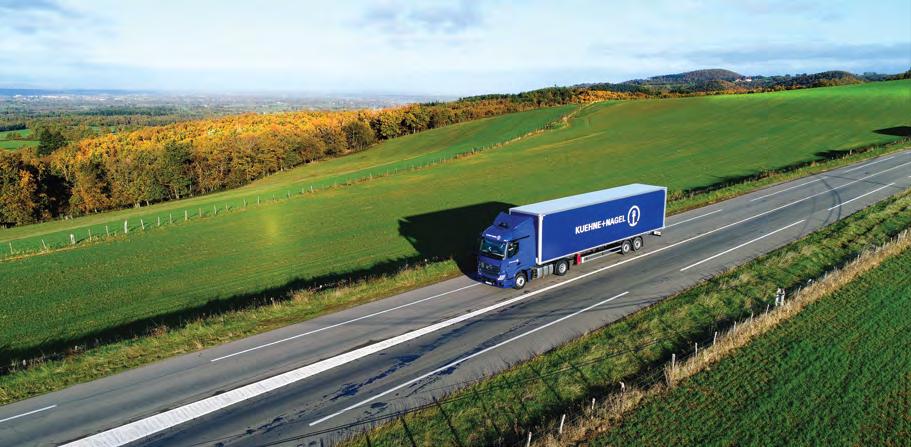
How were cutting-edge technologies integrated into the project?
The Road Carrier Solution is a cloud-native web platform that leverages the latest technologies, such as GenAI. This allows us to rapidly deploy new features at scale, helping our carriers to automate time-consuming workflows online.
For example, by leveraging a combination of high-quality data (in our case, a dataset of thousands of PODs), multi-modal models, and computational power, we have developed a powerful feature that accurately identifies whether a correct POD image has been uploaded. Our ePOD reader saves drivers and dispatchers valuable time by eliminating the need to chase down missing PODs. This time can now be dedicated to focus on other priorities.
In what ways does the Road Carrier Solution contribute to Kuehne+Nagel’s sustainability goals?
The Road Carrier Solution can integrate our carriers into our Book and Claim solutions for HVO and battery-electric trucks (BEVs). Data from the Road Carrier Solution, among other data, will then be used for the CO2e calculations behind the Book and Claim accounting methodology. Enabling our
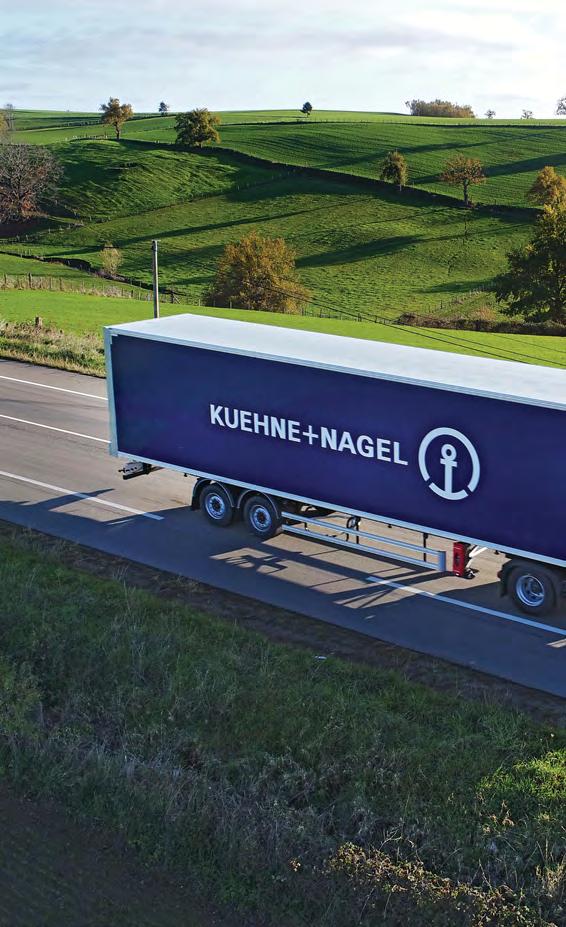


carriers to participate in our certified Book and Claim methodology will help us and our customers decarbonise road freight. This step is also crucial to accelerate the much-needed electrification of road freight because 90% of carriers are SMEs who need help with the finances of fleet electrification. Book and Claim can be part of the solution to solve that hurdle for them.
What has been the feedback from hauliers and other stakeholders since the launch of the Road Carrier Solution?
Over 31,000 satisfied carriers have already joined our platform. For example, one of our partners Abinley Sibanda, Managing Director of ATP commented: “The Road Carrier Solution is easy to use and simply makes sense.” This endorsement reflects the positive feedback that fuels our commitment to continuous innovation. We have implemented feedback loops that directly influence our product roadmap to ensure we stay ahead of the curve. Since then, we learned that many truck drivers use WhatsApp more than text or SMS. Thus, we are working on WhatsApp integration now.
How does the Road Carrier Solution differentiate Kuehne+Nagel from other logistics companies?
I have personally not seen the level of integration of the Road Carrier Solution within an LSP’s digital ecosystem before. Additionally, an important advantage is that, while it may sound cliché, the solution was built by hauliers for hauliers, and we are very proud of that.
How does the Road Carrier Solution integrate with existing logistics and transportation management systems at Kuehne+Nagel?
The Road Carrier Solution uses robust API/EDIs that allow seamless data exchange between the various Transportation Management Systems (TMS). This enables real-time data synchronisation, ensuring that information such as shipment status, tracking, and delivery updates are continuously updated across all systems. By leveraging these integration mechanisms, Kuehne+Nagel’s Road Carrier Solution enhances logistics and transportation management’s efficiency, accuracy, and reliability.

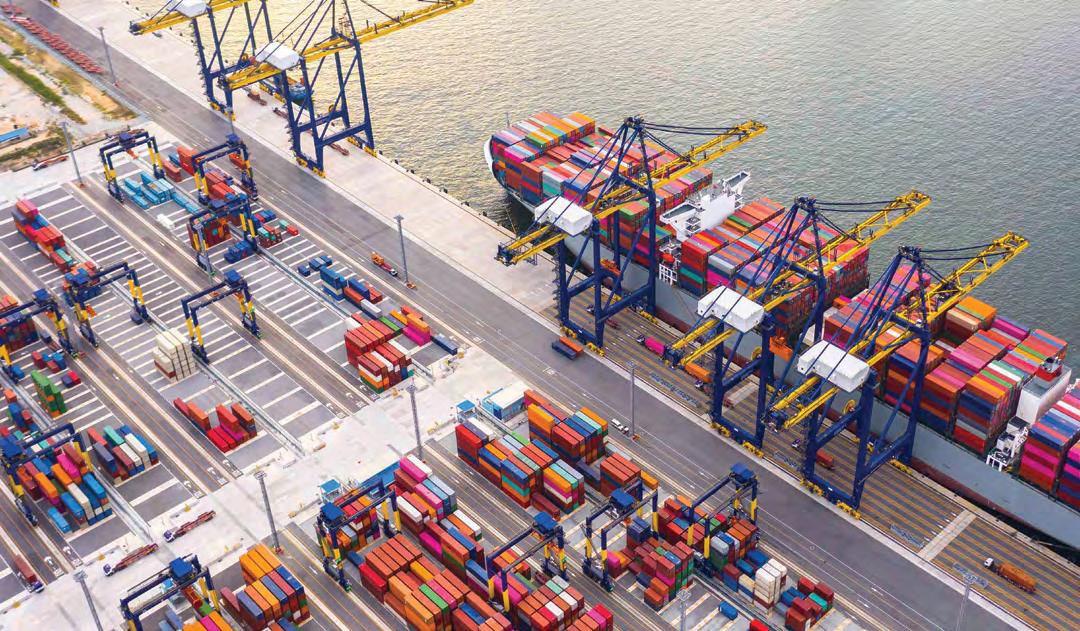
Dubai Maritime Authority (DMA) and Ports, Customs and Free Zone Corporation (PCFC) are pivotal entities shaping Dubai’s maritime landscape. DMA serves as the regulatory body, ensuring maritime safety, managing traffic, and facilitating seamless cargo movements. It also oversees standards in the leisure
sector, regulating vessels and crew registrations to uphold operational excellence and safety.
DMA’s role in the region
DMA plays a crucial role in driving the growth and development of Dubai’s maritime industry. It contributes to Dubai’s reputation as a leading maritime center in the Middle East and beyond through:
1. Regulatory Oversight: DMA serves as the regulatory body for Dubai’s maritime sector, ensuring adherence to international maritime standards and conventions. By establishing and enforcing regulations, DMA enhances safety, security, and environmental sustainability within Dubai’s waters.
2. Facilitation of Maritime Services:
The entity facilitates various maritime services such as vessel registration, licensing of maritime activities, and issuance of permits. These streamlined services support business operations and attract international maritime companies to establish a presence in Dubai. Moreover, DMA manages maritime traffic in Dubai’s waters efficiently, issuing permits for anchorage and overseeing vessel movements. This role minimizes congestion, enhances operational
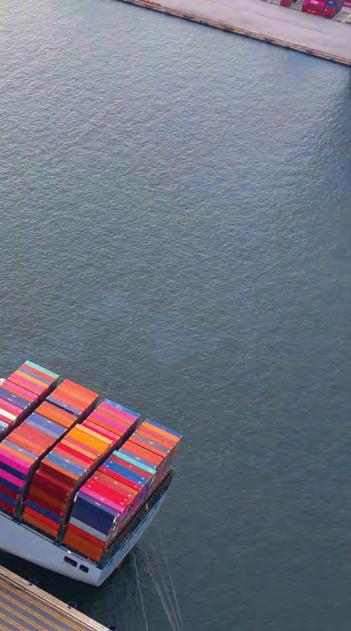
efficiency, and supports smooth maritime operations for commercial and leisure vessels.
3. Industry Development Initiatives: DMA initiates and supports programs aimed at advancing Dubai’s maritime industry. This includes fostering innovation in maritime technology, promoting research and development, and encouraging the adoption of best practices across the sector.

SHEIKH SAEED BIN AHMED AL MAKTOUM, Executive Director of Dubai Maritime Authority
4. Promotion of Maritime Education and Training: DMA places a strong emphasis on enhancing skills and expertise within the maritime workforce. By supporting training programs, certifications, and partnerships with educational institutions, DMA ensures a skilled labor force capable of meeting industry demands.
5. International Collaboration: DMA engages in partnerships and collaborations with international maritime organizations and regulatory bodies. This global engagement enhances Dubai’s standing as a respected maritime hub, facilitating
knowledge exchange and aligning practices with global standards.
Addressing Challenges
Challenges presented in the Middle East include infrastructural demands, regulatory compliance, and environmental sustainability, plus implementing stringent environmental standards, and collaborating with government bodies to streamline regulatory processes.
Regarding infrastructure demands, PCFC/DMA is actively investing in expanding capacities and other key facilities to handle growing trade volumes and enhance logistics

capabilities throughout the region.
In terms of regulatory compliance and environmental sustainability, DMA prioritizes adherence to rigorous international standards. It is implementing advanced technologies and sustainable practices, including green port initiatives and the integration of solar power. These initiatives not only minimize environmental impact but also bolster operational efficiency within maritime logistics.
Addressing rising costs, particularly local container charges, PCFC focuses on optimizing operational efficiencies and cost controls within its port operations.
Referring to recognizing the significance of a skilled workforce in the maritime sector, DMA has forged Memoranda of Understanding (MOUs)
with prominent maritime academies. These collaborations aim to elevate training programs and cultivate a proficient talent pool capable of meeting industry demands.
Navigating geopolitical challenges is also crucial for sustaining operational continuity and efficiency. PCFC works closely with international maritime regulatory bodies and shipping lines to explore alternative routes and solutions. This proactive approach ensures seamless trade flows and reinforces Dubai’s status as a resilient global logistics hub.
Regarding the adoption of technology, DMA prioritizes the regulation and integration of cutting-edge advancements such as autonomous vessels. By establishing robust regulatory frameworks, it aims to safely incorporate these
technologies, enhancing efficiency and safety in maritime operations while reinforcing Dubai’s leadership in technological innovation.
PCFC and DMA are committed to leading sustainability efforts within the maritime sector by prioritizing eco-friendly practices throughout their operations. This commitment is evident in their comprehensive approach, which includes significant investments in renewable energy sources and the implementation of cutting-edge energy-efficient technologies. These initiatives are designed not only to enhance operational efficiency but also to minimize environmental impact.
Central to their sustainability agenda is the promotion of strategies aimed at reducing emissions and conserving
natural resources. PCFC actively engages in global sustainability initiatives and adheres rigorously to international environmental standards. By integrating environmental considerations into their long-term planning and development strategies, PCFC and DMA aim to mitigate the ecological footprint of maritime activities.
Their proactive stance includes continuous improvement in environmental management practices, such as sustainable waste management and the adoption of green port technologies. These efforts underscore their commitment to preserving the ecosystem while ensuring sustainable growth and resilience in Dubai’s maritime logistics industry.
In essence, PCFC and DMA’s dedication to environmental stewardship sets a benchmark in the region, demonstrating leadership in sustainable maritime practices and contributing positively to global efforts towards environmental conservation.
PCFC and DMA have been at the forefront of embracing cuttingedge technologies to revolutionize maritime operations across Dubai. Key innovations include the integration of secure documentation and logistics tracking throughout the maritime supply chain. This technology ensures transparency, reduces paperwork, and enhances efficiency in cargo handling and customs processes.
Additionally, the adoption of IoT (Internet of Things) has enabled realtime monitoring of vessel movements, cargo conditions, and environmental factors in Dubai’s waters. This capability enhances operational awareness, improves safety standards,
and allows for proactive decisionmaking in maritime logistics.
Furthermore, AI (Artificial Intelligence) plays a pivotal role in predictive maintenance and operational optimization within DMA-managed waters. AI-driven analytics help predict equipment failures, optimize maintenance schedules, and streamline vessel traffic management, thereby reducing downtime and enhancing overall operational efficiency.
These technological advancements not only improve cost-effectiveness and operational agility but also elevate customer satisfaction by ensuring faster turnaround times and higher service reliability. By pioneering these innovations, PCFC and DMA reaffirm Dubai’s position as a global leader in maritime innovation and digital transformation, setting new benchmarks for sustainable and efficient maritime practices.
Looking ahead, the maritime logistics industry is poised for
significant advancements driven by digitalization, automation of port operations, and the adoption of sustainable shipping practices. These trends are expected to reshape global logistics operations, enhancing efficiency and reducing environmental impact. PCFC is proactively investing in technological innovations and fostering collaborative partnerships across the supply chain to ensure Dubai remains at the forefront of these developments.
Meanwhile, PCFC/DMA continues to play a pivotal role in Dubai’s maritime sector by focusing on key strategic areas. These include expanding the presence of maritime companies in Dubai, bolstering critical infrastructure, upholding legal and regulatory standards, advancing maritime services, investing in comprehensive training programs, and cultivating a supportive environment for business and investment. These initiatives are crucial for sustaining Dubai’s leadership position in the global maritime industry and reinforcing its status as a premier maritime hub.

Taarek Hinedi, Vice President of FedEx Middle East and Africa Operations, delves into how FedEx consistently pioneers advancements in technology and innovation
Developments in Artificial Intelligence (AI), automation, and the Internet of Things (IoT) have impacted industries across the world, and the regional logistics industry is no exception. Government strategies such as the UAE National Strategy for Artificial Intelligence 2031 and Saudi Arabia’s National Strategy for Data & AI are driving this trend, accelerating digital transformation and the adoption of advanced technologies.
FedEx has been offering innovative digital tools to provide smart logistics solutions to businesses. For example, the FedEx SenseAwareSM tracking solution uses IoT and sensorbased logistics technology to provide near real-time data, such as the temperature and location for urgent and high-value or sensitive shipments. Other smart logistics tools include FedEx Ship Manager, which helps businesses streamline shipment processes, and Electronic Trade Documents which allows customers to submit their customs documentation electronically, simplifying and speeding up customs clearance procedures. These capabilities enable FedEx to stay one step ahead of its customers’ requirements.
The company is also making significant investments in automation and digital intelligence. These investments have a ripple effect on optimizing operations, resulting in one of the smartest networks in the industry. Recently, FedEx made a long-term investment of approximately AED 1.3 billion (more than US$350 million) into its infrastructure and technological advancements in its new state-of-the-art hub
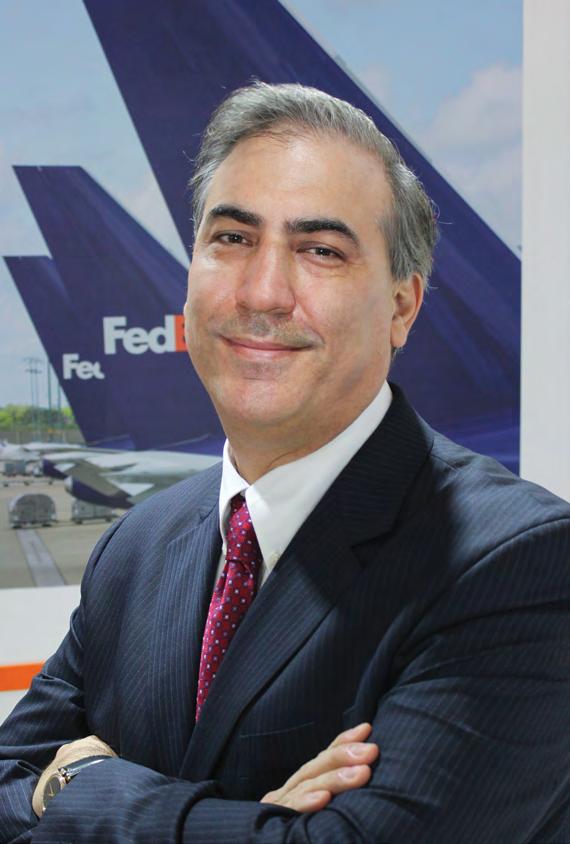
TAAREK HINEDI, Vice President of FedEx Middle East and Africa Operations
at Dubai World Central (DWC). The hub features automated sort systems capable of handling up to 9,000 packages per hour to enhance the efficiency, accuracy, and speed of package processing and distribution. It also includes two automated and AI-equipped high-speed X-ray machines to scan goods and enhance security.
The warehouse of the future will require a host of interconnected technologies and capabilities. That is why at FedEx, in addition to smarter mobility and sorting solutions, it is investing in more advanced temperature-controlled cold storage capabilities and new technologies to manage dangerous goods. These solutions are already operating at its hub at DWC.

For innovation, it is in the DNA of FedEx. The company is constantly looking at the needs of its customers to find new ways to support them. For example, FedEx is evaluating the wider application of blockchain technology to improve shipment visibility, speed up customs clearance, and achieve other cost- and time-saving efficiencies.
Investments in early-stage digital startups – including a computer vision and AI company and a global circular supply chain solutions provider, through the FedEx Innovation Lab –demonstrate FedEx’s commitment to technological advancement.
Additionally, when it comes to lastmile, the company is continuously embracing digital innovations to enhance the end-user experience. For example, FedEx integrated WhatsApp notifications into its FedEx® Delivery Manager e-commerce delivery solution to help customers plan package deliveries around their busy schedules. Online shoppers Picture Proof of Delivery are also offered to let them know their package has been safely delivered to their doorstep.
Furthermore, FedEx is innovating to mitigate the environmental impact of
its last-mile operations. For example, last year, FedEx introduced its first fully electric delivery vehicles in the UAE. On a full charge, these vehicles have an impressive range of 280 kilometers. Backed by the company’s network of quick-charging stations at FedEx facilities across the UAE, they can easily cover a normal day’s route.
The company is also committed to using advanced technology and datadriven insights to create smarter supply chains with differentiated offerings, which helps it deliver greater value and experience for customers.
FedEx Dataworks, which uses data
generated by the FedEx network to generate insights that help optimize operations, digitize supply chains and deliver smart e-commerce solutions. Through FedEx Dataworks, the company has developed deep-learning models that consider shipping factors such as weather patterns and traffic conditions to provide more accurate delivery time estimates.
In addition, to address the increasing prioritization of sustainability in supply chains, A tool called FedEx® Sustainability Insights (FSI) has been developed. This tool allows customers to view estimated CO2 emissions associated with their FedEx shipments, empowering them to understand their environmental impact and make more informed decisions. At FedEx, this data is used to evaluate areas of improvement within the company’s operations, as part of its journey toward net zero carbon emissions.
To conclude, technology powers the future. FedEx, therefore, aims to continue combining logistics with the rich data produced by the company’s network and digital intelligence to respond to the needs and demands of the market and make supply chains smarter for everyone.
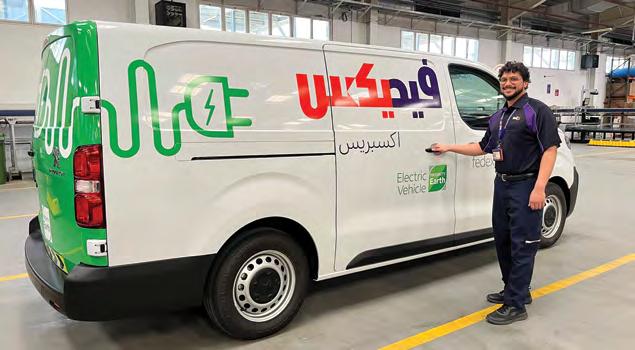

ABDULLA AL HASHMII, Chief Operating Officer, Parks and Zones - DP World GCC
How will the CEPA between the UAE and South Korea influence the logistics industry in the region?
The UAE and South Korea have signed a Comprehensive Economic Partnership Agreement (CEPA) to remove tariffs on goods and services. This landmark agreement aims to streamline cross-border trade and strengthen the economic ties between the two countries.
In 2023, the value of annual trade with South Korea handled by Jafza companies reached US$2 billion, and this agreement will pave the way for that to grow even further. Jafza contributes 45% to Dubai’s trade with South Korea and the CEPA will create new opportunities for businesses and investors, promote innovation and enhance cooperation across a range of sectors. Some of the benefits of the agreement include a significant tariff reduction over a 10-year period, with 93% of South Korea’s tariffs and 91% of the UAE’s tariffs being eliminated.
Additionally, South Korean companies can leverage Jafza as their manufacturing and distribution hub and gain trade benefits with other countries where UAE has signed CEPA agreements, as well as take advantage of the enhanced market access, cost and time savings, and reduced delivery times offered.
Community
Jafza is home to over 10,000 businesses and is a popular hub for South Korean companies looking to establish a presence in the UAE. At the free zone, a range of benefits are provided, including 100% foreign ownership, zero corporate and personal income tax, and no restrictions on currency exchange or repatriation of profits.

There are close to 60 South Korean companies operating in Jafza including seven South Korean Global Fortune 500 companies. Some notable South Korean companies in Jafza include LG Electronics, Samsung, and Hyundai Engineering and Construction.
At Jafza, a South Korean Business Center has been launched to support South Korean companies looking to set up in the free zone. The center provides a range of services, including assistance with company registration, visa processing and company formation to make the process of establishing a business as simple as possible.
Parks & Zones is working closely with its stakeholders to maximize the benefits of the CEPA agreement. It also has a significant presence in South Korea across port terminal operations, logistics services, and multimodal transport solutions that will benefit from the increased trade and economic activity facilitated by the agreement. For example, in March 2024, DP World announced a US$50 million investment to develop a new logistics center in Busan New Port, strengthening the port’s position as a logistics hub for Northeast Asia and reinforcing the global standing of the wider Busan-Jinhae Free Economic Zone business and logistics.
Construction of the facility in the 75,000-sqm land is set to commence at the end of 2024, with operations expected to start by the second quarter of 2026. The DP World Busan Logistics Center will have capacity to process nearly 80,000 TEUs of cargo per year by 2028 and offer comprehensive value-added logistics services such as assembly, processing, and packaging to local and regional customers. The CEPA agreement will support these projects by making it easier for goods to flow between the UAE and South Korea.


The UAE-South Korea CEPA agreement will reduce trade barriers and increase bilateral trade between the two countries, which will increase market demand for logistics services. The CEPA agreement will also eliminate or reduce tariffs on transportation and logistics services, and it includes provisions for customs procedures, trade facilitation, and developing logistics infrastructure. This will streamline logistics operations and improve efficiency.
Jafza is one of the leading free zones in the world, and it takes great pride in being a one-of-a-kind, integrated ecosystem that has been developed to ensure that companies succeed. Last year, Jafza facilitated nearly US$170 billion of trade in Dubai and it is confident that this number will continue to grow.

Halima Jumani, CEO of Kibsons Online Home Delivery Service, highlights the company’s efforts in cultivating a greener future through technology and sustainability
Kibsons is a UAE based home grown family-owned business importing and distributing fresh fruits and vegetables since 1982. The Kibsons group expanded into meat trading and processing and more recently launched its e-commerce platform delivering grocery products directly to thousands of residents in the UAE. Halima’s role in Kibsons began over 25 years ago, with overseeing its financial and operational capabilities, and gradually expanding into supervising support functions including IT and HR developments.
Technology has been an integral part of the Kibsons infrastructure for over 25 years, starting with the basics of timely financial recording. Given its direct importing and wholesale business requirements, Kibsons was one of the first companies to introduce WMS in the fresh produce industry over 15 years ago. This was followed by dynamic and transparent reports of shipment quality reports for overseas suppliers.
Subsequently, the launch of the company’s ERP systems, and the introduction of handheld PDT’s for picking and delivery operations introduced a paper-free work environment and a stronger inventory control system.
Furthermore, AI-based automation was implemented to address cost reduction, especially in managing food waste—a critical challenge in the fresh produce industry. The goal has been to make local purchases more efficient and control wastages as a result of demand forecasting errors. Kibsons is proud to achieve nearly 100% automation and self-regulation in its local FMCG procurement, resulting in a significant 50% reduction in food wastage within the automated local segment.
Another area of technology implementation is the AI-based route optimization for its last mile operations using real-time geo-locations. This has a positive impact on the company’s delivery timings, customer satisfaction, staff working hours, fuel efficiency, the associated carbon footprint and more.

Top trends include connected supply chains, AI, advanced robotics, automation & more. The logistics trends depend on significant changes driven by the implementation of technology solutions in business processes. For example, real-time tracking technology.

To embrace technology and combine it with sustainable ways to optimize efficiency in the lastmile delivery will support a shift to low cost and high speed as a business priority.
Another expected trend in the future is a prediction of approximately 30% of urban drone deliveries.
Kibsons is dedicated to environmental sustainability, constantly seeking ways to minimize its ecological footprint and reduce waste. The company’s commitment to responsible and sustainable practices is demonstrated through its memberships in the UNGC, EGBC, NEMA, and UACA, all aimed at achieving low food waste and reaching Net Zero by 2050.
The company’s key initiatives include:
• Solar Panels: Kibsons’ solar panels save over 25% of annual electricity consumption on average, and more than 50% during winter months.
• Water Recycling Plant: The company’s water recycling plant recycles over 75% of the water used to maintain the demanding cold storage facility.
• Delivery Box Recycling: The goal is to collect over 70% of delivery boxes, made from FSCcertified paper, for reuse or recycling.
• Industrial Composter: Food waste from supply chain operations is transformed into organic compost.
• Data-Driven Food Waste Reduction: Leveraging data and analytics, Kibsons aims to reduce food loss and waste to less than 1% over the next two years.
• Imperfect Produce and Community Support: Imperfect produce and near-expiration products are offered at discounted prices, while daily deliveries ensure underserved communities have access to nutritious food.
In terms of future goals, Kibsons’ next big challenge is to make a feasible plan for an electric fleet to further reduce its carbon footprint on the planet. It is also working towards building a stronger sustainability governance structure to secure a B CORP Certification.
Consistency is often underrated, yet Kibsons aims to consistently deliver quality, availability, affordability, delivery experience, and outstanding customer service as it expands its product range and reaches a broader customer base across the UAE and beyond.


In this interview, Logistics News ME spoke with Abhishek Shah, CoFounder & Group CEO of RSA Global, to discuss the company’s approach to technology, innovation, and sustainability
Can you share with us the journey of founding RSA Global and the inspiration behind entering the logistics industry?
In the early 2000s, my father, Ajay Shah, moved to Dubai with the vision of establishing a real estate enterprise. Inspired by him, I pursued civil engineering at Warwick University and later focused on data integration within the supply chain industry. In 2009, we noticed a growing need for warehousing and started operations at Jebel Ali airport. Our journey led us into chemical logistics, diversification into frozen foods and cold chain logistics, and
expansion into India. Today, RSA Global is a major player in the industry, with a focus on innovation and customer satisfaction.
How would you describe the current logistics landscape in the GCC region?
The GCC logistics sector is dynamic and rapidly evolving, with significant investments in infrastructure. The region’s focus on sustainability and strict regulatory compliance contributes to its position as a pivotal player in the global trade landscape.
With the rapid evolution of technology in logistics and e-commerce, how is RSA Global leveraging innovations like AI and automation to stay ahead in the competitive scene?
RSA Global embraces technology to stay ahead in the logistics and e-commerce sectors. We use AI and automation for efficiency, accuracy, and customer satisfaction. AI-driven predictive analytics help us optimize stock levels and improve supply chain responsiveness. Automation in warehousing ensures faster processing times for e-commerce logistics. We also offer real-time tracking and monitoring powered by AI for complete visibility and improved service reliability.
Sustainability is becoming increasingly important in logistics. Tell us about the initiatives RSA Global has undertaken to reduce its environmental impact. We, as an organization, are dedicated to leading the way in environmental sustainability. We have installed solar panels at our facilities to reduce our reliance on non-renewable energy and minimize our carbon footprint. Additionally, we have implemented advanced water recycling systems and incorporated energy-efficient technologies and green refrigerants into our logistics operations. In the past year, we have reduced 32712 tons of CO2 emissions by generating solar energy, recycled 290 tons of wooden waste, three tons of recycled paper, 58 tons of recycled plastics, and also recycled about 168 tons of cartons/ cardboards. Through these initiatives, we are committed to driving the logistics industry toward a greener and more sustainable future.
ABHISHEK SHAH, Co-Founder & Group CEO of RSA Global

India by building new warehousing facilities and expanding our logistics network. Additionally, we will integrate AI and automation into our operations to make them more efficient. We are also working on increasing our use of renewable energy and adopting eco-friendly practices to prioritize sustainability. These initiatives show our commitment to providing innovative, efficient, and sustainable logistics solutions.
What emerging trends do you believe will have the biggest impact on the logistics industry in the future?
What milestones are you aiming to achieve in the next phase of the company’s growth?
In our upcoming plans, RSA Global is dedicated to achieving important goals. This includes expanding our cold storage capacity at JAFZA by developing RSA Cold Chain in Phase 2. We are also focused on strengthening our presence in

In the near future, the logistics industry will be reshaped by AI and automation, sustainability efforts, e-commerce growth, blockchain technology, and IoT innovations. These changes present significant opportunities for RSA Global and the entire industry to innovate and meet evolving demands effectively.
Is there a final message you would like to share with our readers?
I’d like to emphasize the crucial role of collaboration and adaptability in navigating the complexities of the logistics industry. As we continue to innovate and expand, partnerships and a relentless pursuit of excellence remain foundational to our strategy. Our commitment to sustainability drives us to pioneer eco-friendly practices and reduce our environmental footprint. With a dedicated team and a clear vision for the future, RSA Global is poised not only to meet but to exceed the evolving needs of our customers and stakeholders worldwide. We look forward to continuing our growth trajectory while staying true to our brand promise of being dependable, flexible and innovative.

FADI AMOUDI, Founder and CEO of IQ
Fadi
In 2018, Fadi Amoudi had an idea of launching an e-grocery business, only to encounter the persistent challenge of unreliable solutions. This prompted him to ponder solutions not just for himself, but for all aspiring SME entrepreneurs hindered by similar obstacles. This quest led him into the realm of robotics, driven by a desire to optimize time, space, and operational efficiency.
Out of this exploration emerged the concept of establishing a robotic fulfillment solution tailored for the MENA region—a
technological initiative aimed at empowerment. Thus, three interconnected ventures were launched: IQ Fulfillment, IQ Robotics, and IQ Express, all dedicated to catalyzing e-commerce growth across the region.
IQ Fulfillment is distinctive for bringing both operational expertise and state-of-the-art technology. It does not simply manage logistics; it pushes the boundaries with robotics and AI to ensure a quicker, more precise, and cost-efficient process. The three divisions (IQ Fulfillment, IQ Robotics, and IQ Hybrid) collaborate seamlessly to provide customized solutions that cater to its clients’ specific requirements. In both the UAE and Saudi Arabia, IQ Fulfillment has successfully assisted numerous businesses in streamlining their operations, cutting costs, and enhancing delivery times. its integrated approach enables the delivery of an unparalleled level of service in the region.
Over the past few years, the e-commerce industry in the UAE and the Middle East has witnessed remarkable growth. In the UAE, a tech-savvy and a youthful population have played a crucial role in driving the surge in online shopping. Likewise, Saudi Arabia has also witnessed a significant increase in e-commerce activity, as more consumers are opting for online purchases. The rise of mobile commerce is undeniable, and there is a growing demand for quicker and more flexible delivery options. Additionally, customers now expect personalized experiences and recommendations, which have prompted businesses to embrace new technologies and strategies to remain competitive.
IQ Fulfillment prioritizes technology in all its operations. The company’s advanced robotics and sophisticated software work together to streamline the fulfillment process, ensuring maximum efficiency and accuracy.
The fulfillment center is equipped with cutting-edge robotics that handle tasks like picking and sorting with incredible precision. This automation not only speeds up operations but also guarantees a 99.9% picking accuracy, reducing errors significantly and boosting productivity tenfold. This allows an efficient management of high order volumes, especially during peak times like Black Friday or Cyber Monday.
The company’s technology strategy revolves around the IQ Platform, an all-in-one software solution that seamlessly integrates with various e-commerce platforms. This platform offers real time visibility into operations, enabling businesses to track orders, manage inventory, and oversee billing from a single user-friendly dashboard. It supports both manual and automated warehouse operations, catering to a wide range of business needs. The platform’s predictive analytics and automated order routing optimize delivery routes, further enhancing efficiency and customer satisfaction.
In the context of the UAE and Saudi Arabia, this technology

enables IQ Fulfillment to provide rapid and reliable delivery services, including same-day and nextday options. The company’s software integrates seamlessly with local and international courier services, ensuring smooth and timely deliveries. In addition, the temperature-controlled warehouses and robust security measures safeguard products, while customizable storage solutions and automated systems enhance operational flexibility and efficiency.
Moreover, the IQ Platform’s comprehensive data analytics tools empower businesses to uncover trends, identify bottlenecks, and make informed decisions. This valuable insight helps clients to enhance their operational efficiency and customer service, ultimately leading to growth and profitability.
The e-commerce sector is currently grappling with several challenges. This includes the obstacle of delivering products quickly and cost-effectively. In regions such as the UAE and Saudi Arabia, where customers demand fast delivery, businesses must swiftly adjust to meet these expectations. Managing intricate supply chains
across various markets poses another hurdle. Furthermore, the industry must prioritize sustainability by minimizing its environmental footprint without hindering growth. Striking a balance between these factors requires ongoing innovation and flexibility.
When it comes to sustainability, the topic is a major focus for the organization. IQ Fulfillment is dedicated to minimizing its environmental impact by optimizing delivery routes to reduce carbon emissions and utilizing eco-friendly packaging materials. It is committed to implementing energy-efficient technologies and investing in renewable energy sources in warehouses. In both the UAE and Saudi Arabia, IQ Fulfillment strives to maintain high service standards while minimizing its environmental footprint. The ultimate aim is to make the company’s operations as environmentally friendly as possible, thus playing a part in creating a more sustainable future for the e-commerce industry.
The potential of e-commerce in the future is truly thrilling. The industry is heading towards a world that is more interconnected and automated,

where technology will have an even more significant impact on the way people shop. The market will witness remarkable advancements in AI and machine learning, resulting in enhanced personalization and efficiency. Online shopping will be revolutionized by augmented reality (AR) and virtual reality (VR), creating a more immersive and interactive experience. Moreover, sustainability will play a crucial role, as companies strive to minimize their environmental footprint. In regions such as the UAE and Saudi Arabia, these trends will continue to propel the e-commerce industry to unprecedented heights.
In the next five to ten years, IQ Fulfillment strives to be the leading logistics tech provider not just in the MENA region but globally. Its plans involve expanding its presence further in the UAE and Saudi Arabia and bringing its innovative solutions to more markets. It will continue to leverage the latest technologies to improve its services and meet the evolving needs of its clients. The vision of IQ is to set new standards for efficiency, sustainability, and customer satisfaction, making e-commerce logistics more accessible and effective for businesses of all sizes.
“ ”
At IQ, our goal is to pave the way for innovation in the e-commerce and logistics industries. We are at the beginning of our journey and are looking forward to what lies ahead. Through the fusion of technology and a customercentric mindset, we are confident that we can develop solutions that go above and beyond our clients’ needs. Our mission is to make e-commerce easier, more effective, and environmentally friendly for companies in the UAE, Saudi Arabia, and beyond.
Karim Maksoud,
The automotive industry is currently experiencing a rise in electric vehicles (EVs), advancements in autonomous driving technology, and an increasing focus on sustainability.
Consumer preferences are shifting towards more environmentally friendly and fuel-efficient vehicles, driving manufacturers to innovate and invest in green technologies. Al Habtoor Motors, as a key player, is at the forefront of these advancements, shaping the industry’s future.
We are proud to have various electric vehicle models in the pipeline, which will be available soon, contributing to a more sustainable and innovative automotive landscape.
The recent launch of JAC Commercial Vehicles in the UAE marks a significant milestone for Al Habtoor Motors. This strategic move expands the company’s commercial vehicle portfolio, offering a range of high-quality, durable, and efficient vehicles designed to meet the diverse needs of businesses across various sectors.
JAC Commercial Vehicles are known for their robust performance, advanced technology, and competitive pricing, making them an ideal choice for customers.
The launch focuses on our commitment to providing comprehensive automotive solutions and enhancing our market presence in the commercial vehicle segment. This latest range of heavy-duty vehicles represents a significant leap forward in our commercial vehicle offerings and technological advancements.

transportation sectors. With this new launch, JAC Motors solidifies its position as the leading Chinese commercial vehicle exporter, creating trust-worthy solutions for clients in the UAE and worldwide.
Among the new cars showcased were the PROMATE 2049 and WORKMATE 4146, each manufactured with exceptional attention to detail to meet the specific needs of various commercial industries operating in the UAE. These vehicles are not just modes of transportation; they are innovations tailored to meet the diverse needs of industries across the UAE. Every aspect has been engineered to enhance performance and reliability, benefiting the construction, logistics, and
To strengthen our market position, Al Habtoor Motors has implemented several strategic initiatives. These include expanding our product portfolio to include more diverse and innovative vehicle options, enhancing customer service through digital transformation, and investing in state-of-the-art service centres. Additionally, we focus on continuous employee training and development to maintain a highly skilled and motivated workforce that

can deliver exceptional service to meet our customer’s demands.
The company actively incorporates technological innovations to enhance its operations and customer experience. By leveraging advanced tools and data science, our team understands individual customer requirements, allowing us to offer products and services tailored to meet customer demand. Utilising advanced CRM systems, we are empowered to understand better and cater to our customer’s preferences, and we are integrating AI-driven tools to improve our service delivery and operational efficiency.
Our service centers are equipped
with the latest diagnostic and repair technologies, ensuring that we provide the highest standards of maintenance and support. Furthermore, we explore virtual reality (VR) to offer interactive experiences in our vehicle showrooms.
At Al Habtoor Motors, we are committed to promoting environmental stewardship through several sustainable practices. We are expanding our range of electric vehicles to meet customer demands and align with the UAE’s Vision for Green Mobility, aiming to reduce carbon emissions and promote eco-friendly transportation options. Additionally, we have installed solar panels in our facilities to harness solar energy, significantly reducing our carbon footprint. Our commitment to sustainability is reflected in our continuous efforts to adopt green technologies and implement environmentally responsible practices across our operations. We also emphasise the importance of recycling and waste management within our operations, ensuring we minimise our environmental footprint.

technology, sustainability, and shifting consumer preferences. We anticipate a continued rise in the adoption of electric vehicles and technological advancements.
The future of the automotive industry in the UAE and globally is prepared for transformative changes driven by
Al Habtoor Motors is prepared to adapt to these changes by actively investing in EV infrastructure, enhancing its product offerings with the latest technological advancements, and strengthening its digital capabilities. We are always looking to partner with global brands to stay ahead of industry trends and provide its customers with cutting-edge automotive solutions.

Stefan strategically leads Unifonic to achieve profitable growth while preparing the company for a planned IPO in the coming two to three years. Join us as we discover how he spends his 24 hours.
06:30: Wake up to have breakfast with my family and prepare for the day.
07:15: Drive our kids to school. This is one of my favorite things to do as it allows us to spend some quality time together without the children being on their screens.
08:00: Pit stop at a cafe near the office for my morning coffee. While sipping
the coffee, I quickly scan the local, regional, and global news. I also check my schedule and decide on my daily priorities and activities.
09:00: I arrive in the office, grab another coffee, and spend some time catching up with colleagues.
09:30: Meeting with business finance, treasury, and collections teams to
review, plan, and optimize cash flows for the month. It’s our priority to achieve profitable growth, which means we need to minimize cash burn and reach positive cash flow while growing our top line.
10:30: PMO meeting to review the progress of strategic cross-functional projects such as our cost efficiency and gross margin enhancement initiatives.
11:30: Call with the management of one of our subsidiaries, Sestek, a conversational AI company in Turkey, to discuss synergies and integration, cross sales, etc.
12:00: Lunch with colleagues somewhere in the Dubai Marina Mall.
12:45: Meeting with a potential investor to tell them the exciting Unifonic story and our IPO plans in the coming 2–3 years.
13:30: Management meeting to discuss performance and other key leadership topics.
15:30: Review and discuss our quarterly investor report with investor relations, key messaging, etc.
16:00: Meeting with an investment bank to discuss recent regional IPOs, Unifonic’s IPO preparations, capital markets, tech sector valuations, etc.
18:00: Head home to enjoy dinner with the family.
19:30: Leave the house to play a Padel tennis match in the evening.
21:30: Quiet and relaxing time with my wife, preferably with a Scandinavian Netflix series!
22:00: “Do the round” and say good night to my kids!
22:30: Video call with my parents in Sweden to see how they are doing.
23:00: Bedtime






















